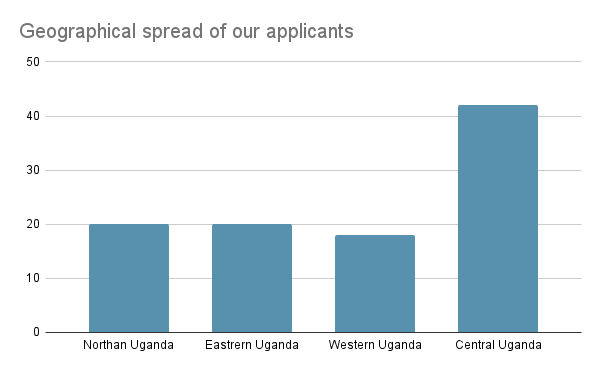2025 Cohort ready to build more impactful businesses
With the 2025 Rootical cohort launched, 50 selected high-potential founders embarked on a systemic business building journey with Rootical, starting with an immersive 7-day Food System Leadership bootcamp in Garuga.
The Bootcamp was an intensive training in regenerative agri-food business, agroecology, entrepreneurship and food systems practice. Why do we say ‘systemic’ venture building? Because we gather forces to build businesses that are designed to address the most critical challenges in Uganda’s food system.
How we got here.
Rootical was legally incorporated as the first steward-owned business in Uganda, and probably the entire region. We also incorporated several portfolio companies in our studio; Eden Seeds, Guarding Fresh and Ecologic.
We published our analysis and the case for Regenerating the Ugandan Food System.
In October 2024: We launched our Call for Founders on World Food Day and partnered with UNCAP to use their online platform “Level” for the selection process. With this, we have begun recruiting high-potential entrepreneurs to join the 2025 Rootical cohort.
By December 2024: We had targeted and reached nearly 1300 leads on LinkedIn, of which 3% ended up applying. As a result of an active effort to reach more women, 42% were female leads. In addition, 63% were new leads, 37% had also applied for the previous cohort. We closed our call for applicants mid-December and the results were overwhelming:
🥳 549 potential candidates logged in (compared to 755 sign-ups in 2023), with 225 meeting the eligibility criteria and 142 successfully submitting a complete application.
🚀 In January 2025 we spent 30 hours on the phone to call 100 people and established a final selection of 50 potential founders to join our Bootcamp.
The key characteristics of the 2025 Cohort
🚺 34% Female future founders.
Without gender-sensitive recruitment this would have been as low as 15-20%. Despite very intentional efforts and outreach in our bid to reduce the gender gap in founder teams, we did not make our target of 40%. Unfortunately, two women cancelled their participation to the bootcamp on a last-minute notice due to personal circumstances.
🎂 Age: Two thirds of the potential founders are under 35 years-old and considered youth; one third is 35 years-old and more.
🧩 We have identified 3 types of founders:
Those that have deep domain expertise and are good at building stuff (Builders: 56%)
Those that are good at selling it (Sales wizards: 10%)
Those that are experienced managers to steward it (Stewards: 28%)
🌿 We have invited people with a wide variety of backgrounds and domain expertise: in Agribusiness (17 individuals), agronomy (3), finance (3), management (8), marketing (1), sales (4), nutrition (3), tech (4) and other (7).
What we learned
One of our biggest learnings in selection was the importance of focusing on what candidates have actually done, rather than what they hope to do. We avoided aspirational questions this time. The most insightful responses came from real-world experiences — projects they’ve built, challenges they’ve overcome, and lessons they’ve learned.
This practical approach revealed key traits like grit, resilience, and an entrepreneurial mindset, which were stronger indicators of potential success than aspirational statements (which, in today’s world, can be easily crafted with AI).
Overall, we had slightly less applicants than in 2023, but have the impression of a stronger and more aligned talent pool to work with. Even for those that did not make it, we appreciate you all for the time and effort invested in this process. We see your skills and alignment, and want to keep in touch. Who knows what the future brings?


